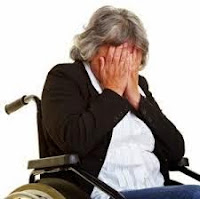 There are dark days ahead for sick, disabled and depressed people in Canada. The Supreme Court recently struck down the nation's laws against assisted suicide. The high court's judges unanimously supported this terrible decision. What sort of society helps suicidal people kill themselves?!
There are dark days ahead for sick, disabled and depressed people in Canada. The Supreme Court recently struck down the nation's laws against assisted suicide. The high court's judges unanimously supported this terrible decision. What sort of society helps suicidal people kill themselves?!The high court defined the scope of assisted suicide to include an "illness, disease or disability" that causes "enduring suffering that is intolerable to the individual the the circumstances of his or her condition." It also includes those people suffering "psychological pain". Assisted suicide would be an option even if the person has refused available treatments.
It should be noted that less than two years earlier Canada's
Parliament unanimously supported the idea of a national suicide prevention strategy. Parliament supported suicide prevention while the Supreme Court supports assisted suicide. What's worse is that the vast majority of Canadians support both! Why the difference? Suicide prevention is intended to save suicidal healthy and able bodied people, assisted suicide is intended kill off suicidal sick and disabled people.
Am I wrong? How else should someone like me (incurably ill and disabled with advanced multiple sclerosis) interpret the apparent contradiction between the highest legislative and judiciary bodies in the land?
What will happen to conscience rights for physicians who refuse to participate in assisted suicide or refer patients for assisted suicide? Will their professional or licencing organizations support
conscientious objectors? It's dicey. Already I have been told by some physicians of their fears conscience rights will not be respected. Will the Canadian Medical Association and their provincial/territorial counterparts protect conscience rights of their members? What about nurses?
How will provincial governments in charge of health care delivery respond? Will they willing go along with the killing? Yes they will. They already violated the sanctity of human life by paying for all abortions for the past forty years. They pay for killing at the beginning of life, why not the end of life? At some point, the grades or distinctions of barbarism cease become murky. A deadly Rubicon has been crossed! Welcome to 21st Century Canada.
Yes, there are dark days ahead. But Christians must collectively
light lamps of love with life-affirming action. Our light of Christian love will shine in the darkness of our culture. We can start outreaches of care and inclusion for the sick and disabled in much the same way as Christians established pregnancy care centers for women in crisis pregnancies in the 1980s. That is a template. The care is different but the Christ-centered love and concern are the same. Remember, love is a verb.
Establish Christian suicide hotlines and advertise them broadly. Connect suicidal people, and their families, to Christian Counselling and appropriate palliative care resources with up-to-date pain management. Make your churches welcoming, accessible and barrier free to people with disabilities. Reach out to families in crisis and invite them into the tender care of your church communities. Establish rosters of church-based trained volunteers to provide respite care for families facing a death or profound disability of a family member. Provide ongoing grief counselling.
There are dark days ahead but we can be beacons of light pointing to a better way -- the way of Christ. I write these words from authentic personal experience. I have known dark days too, yet in the midst of sickness, disease and disability I have seen the light of Jesus Christ.
Mark




No comments:
Post a Comment